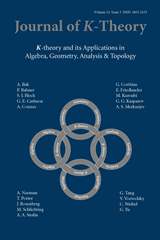Crossref Citations
This article has been cited by the following publications. This list is generated based on data provided by Crossref.
Mazza, C.
and
Weibel, C.
2013.
Schur-finiteness in λ-rings.
Journal of Algebra,
Vol. 374,
Issue. ,
p.
66.


